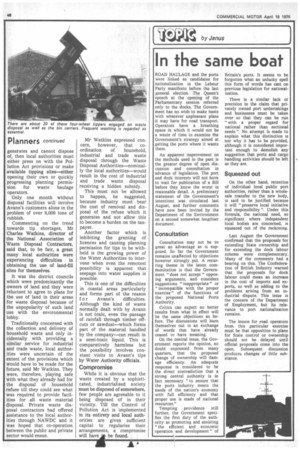in the same boat
Page 48

If you've noticed an error in this article please click here to report it so we can fix it.
ROAD HAULAGE and the ports were linked as candidates for nationalisation in the Labour Party manifesto before the last general election. The Queen's speech at the opening of the Parliamentary session referred only to the docks. The Government has no wish to make haste with whatever unpleasant plans it. may have for road transport. Operators have a breathing space in which it would not be a waste of time to examine the Government's strategy aimed at getting the ports where it wants therm An apparent improvement on the methods used in the past is the greater degree of open discussion and consultation in advance of legislation. The port and dock interests will not have to wait for publication of a Bill before they know the worst in reasonable detail. A preliminary statement of the Government's intentions was circulated last August, and further comments have now been invited by the Department of the Environment on a second somewhat lengthier document.
Consultation
Consultation may not be so great an advantage as is supposed. So far the Government remains unaffected by objections however strongly put. A recurring theme in the latest communication is that the Government "does not accept" opposing arguments, and considers suggestions " inappropriate" or "incompatible with the proper exercise" of the functions of the proposed National Ports Authority.
Critics can expect no better results from what in effect will be the same objections as before. The discussions will burn themselves out in an exchange of words that have already ceased to have meaning.
On the central issue, the Government reports the opinion, no doubt expressed from many quarters, that the proposed change of ownership will damage efficiency. An adequate response is considered to be the direct contradiction that a strong central authority is in fact necessary " to ensure that the ports industry meets the needs of the nation's economy with full efficiency and that proper use is made of national resources."
Tempting providence still further, the Government specifies the first duty of the authority as promoting and assisting 'the efficient and economic operation and development" of Britain's ports, It seems to be forgotten what an unlucky spell this form of words has cast on previous legislation for nationalisation.
There is a similar lack at precision in the claim that privately owned port undertakings and businesses must be taken over so that they can be run "with a proper regard for national rather than sectional needs ". No attempt is made to explain what this distinction is nor why it has to be provided, although it is considered important enough to demolish any suggestion that ports and cargo handling activities should be left as they are.
Squeezed out
On the other hand, retention of individual local public port authorities, rather than a wholesale transfer to the new body, is said to be justified because it will "preserve local initiative and responsibility ". Under this formula, the national need, so significant where independent local bodies are concerned, is squeezed out of the reckoning.
Last August the Government confirmed that the proposals for extending State ownership and for extending the dock labour scheme were complementary. Many of the comments had a bearing on this. The Confederation of British industry warned that the proposals for dock labour could mean an increase in the cost of imports and exports, as well as adding to the problems arising from an industrial dispute. This issue is the concern of the Department of Employment, but its relevance to port nationalisation remains.
The lesson for road operators from this particular exercise must be that opposition to plans for State control or ownership should not be delayed until official proposals come into the open. Subsequent discussion produces changes of little substance.








































































































































